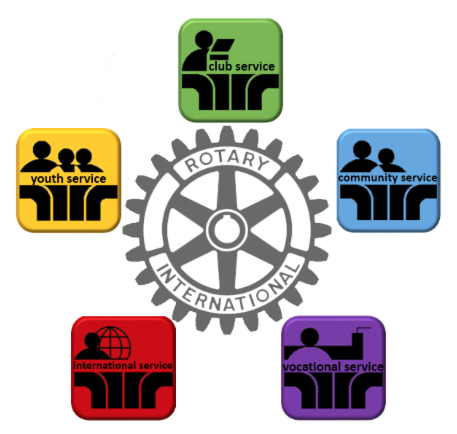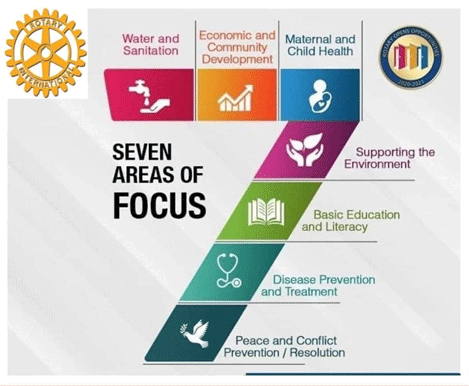Object of Rotary
The Object of Rotary is to encourage and foster the ideal of service as a basis of worthy enterprise and, in particular, to encourage and foster:
- The development of acquaintance as an opportunity for service;
- High ethical standards in business and professions; the recognition of the worthiness of all useful occupations; and the dignifying of each Rotarian’s occupation as an opportunity to serve society;
- The application of the ideal of service in each Rotarian’s personal, business, and community life;
- The advancement of international understanding, goodwill, and peace through a world of fellowship of business and professional persons united in the ideal of service.
Avenues of Service
The term Avenues of Service refers to the five parts of the Object of Rotary: Club Service, Vocational Service, Community Service, International Service, and New Generations Service.

- Club Service involves all of the necessary activities Rotarians perform to make their club function successfully.
- Vocational Service describes the opportunity each Rotarian has to represent the dignity and value of his or her vocation to the other members of the club, as well as the responsibility of the club to undertake projects related to career planning and vocational training.
- Community Service pertains to those activities that Rotarians undertake to improve the quality of life in their community.
- International Service describes the many programs and activities that Rotarians undertake to advance international understanding, goodwill, and peace.
- New Generations (Youth) Service recognizes the positive change implemented by youth and young adults involved in leadership development activities, community and international service projects and exchange programs that enrich and foster world peace and cultural understanding.
Areas of Focus

Rotary Club Bylaws
The Rotary Club’s bylaws provide guidelines for managing the club. The Recommended Rotary Club Bylaws are redeveloped in harmony with the Standard Rotary Club Constitution and reflect current Rotary policy. They can be adapted to meet the club’s needs, goals, and activities and reflect its unique identity. Over time, the club’s bylaws should be revisited for revisions so they reflect new practices and procedures.
The club may amend its bylaws at any regular meeting where a majority of the club’s members are present. Any proposed amendments should first be approved by the club’s board, and all members should be notified of proposed amendments at least 10 days before the vote. Amendments to the bylaws must be approved by a two-thirds majority vote.
The Rotary Club Constitution
The Standard Rotary Club Constitution must be adopted by all clubs admitted to membership in Rotary International. It provides a model framework for Rotary club operations. Following the Council on Legislation, which will occur in 2010 and 2013, the Standard Rotary Club Constitution was updated to include Council enactments.
Rotary is a grassroots organization, with most of its service efforts being carried out at the club level. The district and international structure is designed to support the clubs and help them provide more specie in their communities and abroad.
Clubs
Rotarians are members of Rotary clubs, which belong to the global association Rotary International (RI). Each club elects its own officers and enjoys considerable autonomy within the framework of rotary’s constitution.
Districts
Clubs are grouped into 530 RI districts, each led by a district governor, who is an officer of RI. The district administration, including assistant governors and various committees, guides and supports the clubs.
RI Board
The 19 member RI Board of Directors, which includes the RI president and president-elect, meets quarterly to establish policies. Traditionally, the RI president, who is elected annually, develops a theme and service emphases for the year.
The Secretariat
Rotary International is headquartered in the Chicago suburb of Evanston, Illinois, with seven international offices in Argentina, Australia, Brazil, India, Japan, Korea, and Switzerland. The office for RI in Great Britain and Ireland, located in England, serves clubs and districts in that region. The Secretariat’s chief operating officer is the RI general secretary, who heads a 740 member staff working to serve Rotarians worldwide.
.png)












